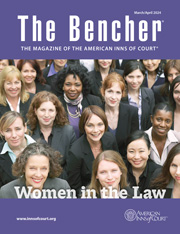Justice Kagan Recuses from a Case, Cites New Supreme Court Code of Conduct
The Bencher | March/April 2024
By John P. Ratnaswamy, Esquire

 On November 13, 2023, the Supreme Court of the United States released its first-ever Code of Conduct. The court acted in the face of some criticism of the absence of such a code and of certain more specific matters generally involving questions of potential disqualification (recusal).
On November 13, 2023, the Supreme Court of the United States released its first-ever Code of Conduct. The court acted in the face of some criticism of the absence of such a code and of certain more specific matters generally involving questions of potential disqualification (recusal).
The court issued the following Statement regarding the Code:
“The undersigned Justices are promulgating this Code of Conduct to set out succinctly and gather in one place the ethics rules and principles that guide the conduct of the Members of the Court. For the most part these rules and principles are not new: The Court has long had the equivalent of common law ethics rules, that is, a body of rules derived from a variety of sources, including statutory provisions, the code that applies to other members of the federal judiciary, ethics advisory opinions issued by the Judicial Conference Committee on Codes of Conduct, and historic practice. The absence of a Code, however, has led in recent years to the misunderstanding that the Justices of this Court, unlike all other jurists in this country, regard themselves as unrestricted by any ethics rules. To dispel this misunderstanding, we are issuing this Code, which largely represents a codification of principles that we have long regarded as governing our conduct.”
Canon 3 of the Code states, “A Justice Should Perform the Duties of Office Fairly, Impartially, And Diligently.” Canon 3(B) addresses “Disqualification.” Canon 3(B) is too lengthy to quote here, but Canon 3(B)(2) includes a general principle of disqualification when “the Justice’s impartiality might reasonably be questioned, that is, where an unbiased and reasonable person who is aware of all relevant circumstances would doubt that the Justice could fairly discharge his or her duties,” and then illustrates that principle in six categories of scenarios, but subject to Canon 3(B)(3), stating: “The rule of necessity may override the rule of disqualification.”
The Code does not have an enforcement mechanism. The rule of necessity rule is a general principle that a judge may hear a case despite bias or personal interest when disqualification would result in the lack of any competent tribunal. (It is not clear to me when and how that principle would be applied to a nine-member court.)
The Code largely is modeled on 28 U.S.C. § 455 (“Disqualification of justice, judge, or magistrate judge”), but Section 455 does not contain an exception for the rule of necessity.
On January 9, 2024, the court announced that Associate Justice Elena Kagan had recused herself from two cases that parties sought to bring before the court. In doing so, Kagan cited the Code’s Canon 3(B)(2)(e). This instance reportedly is the first time that a member of the court has recused themselves citing the Code. Canon 3(B)(2)(e) states: “The Justice has served in government employment and in that capacity participated as a judge (in a previous judicial position), counsel, advisor, or material witness concerning the proceeding or has expressed during prior government or judicial service an opinion concerning the merits of the particular case in controversy.”
Kagan had served previously as solicitor general of the United States (the first woman to do so) and had been involved in a prior appeal by one of the parties seeking review in the current cases. The federal public defender’s office reportedly agreed with the recusal.
Other justices recused themselves from various cases on January 9, but without a statement of reasons or citation of the Code.
John P. Ratnaswamy, Esquire, is the founder of The Law Office of John Ratnaswamy, LLC, in Chicago, Illinois. He is an adjunct professor of legal ethics at the Northwestern University School of Law. He is the current chair of the American Bar Association Solo, Small Firm, and General Practice Division’s Committee on Ethics and Professional Responsibility. This column should not be understood to represent the views of any of those entities or his or the firm’s current or former clients.